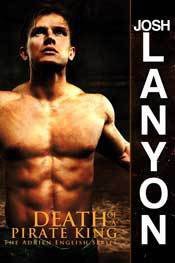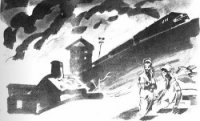A Death In The Family - Agee James (электронные книги без регистрации .TXT) 📗
Now these images manifolded upon each other with great rapidity, at their constant center, the proud, cut chin, and could be driven from his mind's eye only by two others, Jay as he felt he had seen him, the contact after the accident, lying, they had told him, so straight and unblemished beside the car, the dead eyes shining with starlight and the hand still as if ready to seize and wrestle; and as he had last actually seen him, naked on the naked table, a block beneath his nape.
Somebody sighed, from the heart; he looked up; it was Hannah. They were all looking downward and sidelong. His sister's face had altered strangely among this silence; it had become thin, shy and somehow almost bridal. He remembered her wedding in Panama; yes, it was much the same face. He looked away.
"Aunt Hannah, will you please stay with me here tonight?" Mary asked.
Mama, Andrew thought, and his heart went out to her as he looked at her deaf, set smile.
"Why certainly, Mary."
Joel decided not to look at his watch. Andrew covertly glanced at the mantel clock. It was…
"I hope Mama won't mind too much. I hope she'll understand. Poor thing. Mama," she suddenly called, and put her hand on her mother's hand and on the trumpet. Her mother eagerly tilted it. "I think it's about time we all tried to get some sleep." Her mother nodded, and seemed to be about to speak; Mary pressed her hand for silence and continued, "Mama, I've asked Aunt Hannah if she'll stay here tonight with me." Her mother nodded and again seemed to be about to speak. Again Mary pressed her hand: "I'd love it if you could, but I know how it would disrupt things at eleven-fifteen,"-"Hahh," her father exclaimed-"and I just…"
"Tell her, Poll!"
"Also, Mama. Also it's just-I hope you'll understand and not mind, Mama dear-it's just it would be so very hard for us to talk, quietly, and with the children and all, why I just sort of think…"
"Why certainly, Mary," her mother interrupted, in her somewhat ringing voice. "I absolutely agree with you. I think it's so nice that Hannah can stay!" she added, almost as if Mary and Hannah were little girls.
"I hope you know, Mama, how very much!-I hope you don't mind. I just appreciate it so much, I…"
Her mother patted her hand rapidly. "It's perfectly all right, Mary. It's very sensible." She smiled.
Mary put an arm around her and hugged her; she turned her aging face and smiled very brightly and Mary could see the tears in her eyes. She was speechless and her head was shaking in her effort to convey her love and the entirety of her feeling. "Anything I can do, dear child," she said after a few moments. "Anything!"
"Bless you, Mama!"
"Beg pardon?"
"I said bless you, dear!"
Catherine patted her hand on the back and smiled even more tightly.
I love you so much! Mary exclaimed within herself.
"Praps the children," Catherine said. "I could take care, if-it would be more, convenient…"
"Oh, I don't think we should wake them up!" Mary said.
"She doesn't mean…" Andrew began.
"Tomorrow," her mother said. "Just, perhaps, during the-interim…"
"That's wonderful, Mama, that may turn out to be just the thing and if it is I most certainly will. Most gratefully. It's just, I'm in such a spin it's just too soon to quite know yet, make any plans. Anything. Tomorrow."
"Tomorrow then."
"Thank you, Mama."
"Not at all."
"Thank you all the same."
Her mother smiled and shook her head.
Joel and his sister stood up.
"Mary, before we go," Andrew said.
"?"
"It's much to late, Mary, you're much too tired."
"Not if it's important, Andrew."
"Let's let it go till morning."
"What is it, Andrew?"
"Just-various things we'll have to discuss pretty soon." He took a deep breath and said in a loud voice. "Getting a plot, making arrangements about the funeral; seeing about a headstone. Let's wait till morning."
Earth, stone, a coffin. The ugly craft of undertakers became real and tangible to her, but as if she touched them with frozen hands. She looked at him with glazed eyes.
"That'll be plenty of time, Mary," she heard her aunt say.
"Of course it will," Andrew said. "It was foolish of me to even speak of it tonight."
"Well if there's time," she said vaguely. "Yes if there's time, Andrew," she said more distinctly. "Yes, then I'd rather, if you don't mind. Tomorrow in the morning." She glanced at the clock. "Goodness this morning," she exclaimed.
"Of course not," Andrew said. He turned to his aunt and said in a low voice, as one speaks before an invalid, "Let her sleep if she can. You phone me."
Hannah nodded.
"Must've…" Joel said, and went into the hall.
"What's…" Hannah began.
"Hat I guess. Mine too." Andrew left the room; in the hall he met his father, carrying his own hat, his wife's, and Andrew's.
"Left them in the kitchen," his father said.
"Thank you, Papa," Andrew took his hat.
Catherine was standing uneasily in the middle of the room, holding her trumpet and her purse and looking towards the hall door. "Thank you, Joel," she said. She settled and pinned her hat by touch, a little crooked, and looked at Hannah inquiringly.
It's all right, Catherine," her husband said.
Andrew was watching his sister. It seemed to him that these preparations for departure put her into some kind of silent panic. Maybe we should stay, he thought. All night. I could. But Mary was chiefly watching her mother's difficulties with the hat. No, it's the slowness, he corrected himself. Sooner the better.
"Well, Mary," he said, and stepped to her and put his arms around her. He saw that her eyes were speckled; it was as if the irises had been crushed into many small fragments; and in her eyes and her presence he felt something of the shock and energy which had radiated so strongly from the dead body. She was new; changed. Nothing I can do, he thought.
"Thank you for everything," she said. "I'm so sorry you had it to do."
He could not answer or continue to look into her eyes; he embraced her more closely. "Mary," he said finally.
"I'm all right, Andrew," she said quietly. "I've got to be."
He nodded sharply.
"You come up in the morning. We'll-make our plans."
"Sleep if you can."
"Just come up first thing because I know there's an awful lot to do and not much time."
"All right."
"Good night, Andrew."
"Good night, Mary."
"Bless you," her mother exploded, almost as if she were cursing; deaf, near-sighted, she caught her daughter in her arms with all her strength and patted her back with both hands, thinking: how young and good she smells!
She wants so to help, Mary realized. To stay! Under her caress she felt the hard, round shoulders, sharp backbone, already hunching with age. Leaning back in her mother's embrace, she straightened the hat, looked into the trembling face, and kissed her hard on the mouth. Her mother twice returned the kiss, then stood aside, gathering her long skirt for the porch steps.
"Poll," her father said; she felt the beard against her cheek and heard his whisper: "Good girl. Keep it up."
She nodded.
"Good night," Hannah said.
"Good night, Aunt Hannah," Andrew replied.
"Night, Hannah," her brother said. He steered Catherine by one elbow, Andrew by the other; they went onto the porch.
"Light!" Mary exclaimed.
"What?" Andrew and Hannah asked, startled.
Mary switched on the porch light. "Tsall right," her father said in mild annoyance. "Thank you," her mother chimed, politely. Mary and Hannah stood at the door while they carefully descended the porch steps, and they watched them until they reached the corner and then until they had safely crossed the street. Under the corner lamp, Andrew turned his head and lifted and let fall his hand in something less than a wave. The others did not turn; and now Andrew also had turned away, and they went carefully away along the sidewalk, and Mary switched off the light, and still watched. Hannah could no longer see them now, and after a few moments, gave up pretending to watch them and watched Mary as she looked after them, as intently, Hannah felt, as if it were of more importance than anything else, to see them until the last possible instant. And still Mary could see them, somewhat darker against the darkness and of uneven heights, growing smaller, so that it was not finally the darkness which made them impossible to see, but the corner of the Biddles' house.




